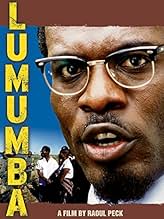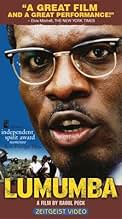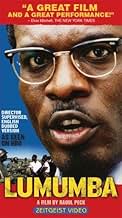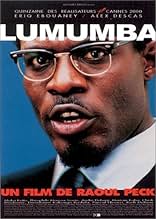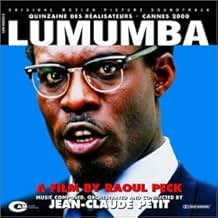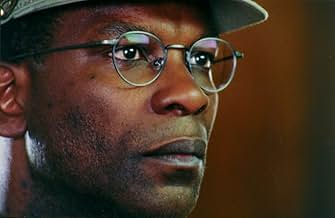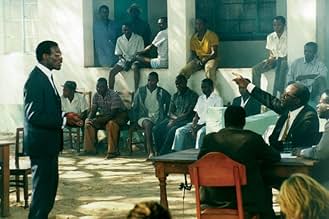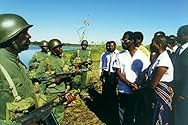VALUTAZIONE IMDb
7,2/10
2161
LA TUA VALUTAZIONE
Aggiungi una trama nella tua linguaThe true story of controversial leader of independent Congo Patrice Lumumba.The true story of controversial leader of independent Congo Patrice Lumumba.The true story of controversial leader of independent Congo Patrice Lumumba.
- Regia
- Sceneggiatura
- Star
- Premi
- 3 vittorie e 8 candidature totali
Théophile Sowié
- Maurice Mpolo
- (as Théophile Moussa Sowie)
Makena Diop
- Thomas Kanza
- (as Oumar Diop Makena)
Dieudonné Kabongo
- Godefroid Munungo
- (as Dieudonné Kabongo Bashila)
Pascal N'Zonzi
- Moïse Tshombe
- (as Pascal Nzonzi)
Recensioni in evidenza
10Anyanwu
This movie is the best movie I have seen in a long time. It is also the best movie seen that uses a drama to tell history, without going to speculation such as with JFK,Nixon or Hoffa. It deftly depicts the clutches that Belgium had on the Congo. It also teases out easily for us the European and American forces that were behind the power the inflict the Congo today. The film was sure to specifically implicate the U.S., rightly so, in the murder of Lumumba. This film could never be made in the U.S. for U.S. film rarely criticizes itself in acts of imperialism and murder. (Save Stone's JFK) It also lets us in on the problems that were present with the inner conflict of the Congo, between Lumumba, Mobutu and Katanga. We can see how precarious countries sit in establishing new governments when their history is one of colonization and those who were the colonizers continue to pull the strings of power and force. The film is excellently shot with Eriq Ebouaney an excellent Lumumba. The cast is great and they really draw you into the feeling of the climate in the Congo during that time.
Again, this is a must see for those who love drama with a correct historical background. See my notes on Quilombo.
Again, this is a must see for those who love drama with a correct historical background. See my notes on Quilombo.
I feel very fortunate to have the chance to not only watch this film, but also learn more about this fascinating person and time. Lumumba is an outstanding portrayal, giving a full sense of the story without falling into the usual Hollywood trappings - yes, he is shown with his wife and children, but the essence of the story is his politics and those of the still-emerging independent Congo. The film is brilliantly made, moving along at a pace that is consistently engaging. I look forward to seeing other Raoul Peck films, as well as more from Eric Ebouaney!
I liked this film but to like it, you must know more about the history of Congo. You must also know some more about Belgians and their disrespect (and that is a metaphore!) of the Congolese state.
Lumumba and the Congolese people didn't deserve this as he was right. We Belgians did exploit them for decades. But just because Lumumba reacted not so friendly to Bwana Kitoko (the king was called this way by the Congolese in a previous visit, he was hailed as a great leader) they had to further destabilize Congo and assassinate Lumumba. So he called for the help of the USSR, that was his only option as everybody else was against him. For the Congolese people the US didn't do anything like they did for us with the Marshall Plan. They did support Mobutu's cruel dictatorial rule with lots of money. What good did that do for the average Congolese?
And the trouble didn't stop with the flight of Mubutu. In modern sociological terms, Congo is considered a failed state. And that has it's reasons (and we Belgians are responsible for a large part of those). I hope that Lumuba's dream will still come true and that the Congolese peace process will last so peace and a way of living that is accepted by all Congolese may finally come for them.
Back to the film: You can't expect to understand the complex situation the new independent Congo was put in just by watching this film. That's like thinking the film Enemy at the Gates will explain me everything about the battle of Stalingrad. The film is restricted in many ways and the viewer must understand that. first: It's a film, not a documentary. Some of the scenes are interpretations but they are needed for the plot. second: The main character is Lumumba. Not everything about the troubles in Katanga or elsewhere is told, neither is everything about Mobutu told. It would have been an endless film that way. third: The film is an African film, let them create their own ways of telling this story. White people shouldn't tell them how to tell a story. But I'm glad that some funded this film that tell some people more about an unclear history. It might encourage them to find out more about Lumumba or various other things after the credits roll away and that is a good thing.
Lumumba and the Congolese people didn't deserve this as he was right. We Belgians did exploit them for decades. But just because Lumumba reacted not so friendly to Bwana Kitoko (the king was called this way by the Congolese in a previous visit, he was hailed as a great leader) they had to further destabilize Congo and assassinate Lumumba. So he called for the help of the USSR, that was his only option as everybody else was against him. For the Congolese people the US didn't do anything like they did for us with the Marshall Plan. They did support Mobutu's cruel dictatorial rule with lots of money. What good did that do for the average Congolese?
And the trouble didn't stop with the flight of Mubutu. In modern sociological terms, Congo is considered a failed state. And that has it's reasons (and we Belgians are responsible for a large part of those). I hope that Lumuba's dream will still come true and that the Congolese peace process will last so peace and a way of living that is accepted by all Congolese may finally come for them.
Back to the film: You can't expect to understand the complex situation the new independent Congo was put in just by watching this film. That's like thinking the film Enemy at the Gates will explain me everything about the battle of Stalingrad. The film is restricted in many ways and the viewer must understand that. first: It's a film, not a documentary. Some of the scenes are interpretations but they are needed for the plot. second: The main character is Lumumba. Not everything about the troubles in Katanga or elsewhere is told, neither is everything about Mobutu told. It would have been an endless film that way. third: The film is an African film, let them create their own ways of telling this story. White people shouldn't tell them how to tell a story. But I'm glad that some funded this film that tell some people more about an unclear history. It might encourage them to find out more about Lumumba or various other things after the credits roll away and that is a good thing.
I was a pre-teen when news of Lumumba's assassination hit the news so I very vaguely recall at the time it was sad a leader who tried to shuck the reigns of colonialization was killed for efforts towards independence.
There is woefully insufficient time in a 2 hour movie to completely explain the whos whys and wherefores of a political assassination. Suffice to say the victors write the history and even if the truth were portrayed adequately, who's truth would it be? As the character Lumumba says in the movie, he came 50 years too early.
I found the story fast paced with good production values. It mirrored the all too brief time in power for a promising African leader, and there is a dearth of them lately. That continent still suffers a vacuum in its leadership, a state that will take another century to rectify. The film and life of Lumumba is a lesson of how badly things can go wrong in a climate of conflicting objectives and numerous parties and forces acting in a volatile setting. Congo had just gained independence and tribal rivalry reared its head very quickly. It is suggested for example that Lumumba seek sanctuary in the province of Katanga, where months before he had been refused landing rights in a flight to visit the troubled area. Politics makes strange bedfellows.
The time of the 1960s was the height of the cold war and Lumumba's courting of Soviet aid to fast track his country did not win any favours. No doubt the superpower USA had at least some hand in his death, much the same as Ngo Dhin Diem in Vietnam around the same time. Attempts to assassinate Fidel Castro at that time are also well documented so it may be some measure of just desserts that Kennedy met his end with an assassin's bullet.
Read up on that period of history then watch the movie to get additional value for the time you invest, and then you will be prepared to better understand contemporary events in far off places when national interests are at stake. Oil, diamonds, bauxite, coffee, whatever; liberty always seems to take a back seat when these interests get the ear of the powers that be.
Realism in the film is reinforced with the french dialog. I also understood the subtleties having studied military coups in university under a black professor who came from Nigeria.
There is woefully insufficient time in a 2 hour movie to completely explain the whos whys and wherefores of a political assassination. Suffice to say the victors write the history and even if the truth were portrayed adequately, who's truth would it be? As the character Lumumba says in the movie, he came 50 years too early.
I found the story fast paced with good production values. It mirrored the all too brief time in power for a promising African leader, and there is a dearth of them lately. That continent still suffers a vacuum in its leadership, a state that will take another century to rectify. The film and life of Lumumba is a lesson of how badly things can go wrong in a climate of conflicting objectives and numerous parties and forces acting in a volatile setting. Congo had just gained independence and tribal rivalry reared its head very quickly. It is suggested for example that Lumumba seek sanctuary in the province of Katanga, where months before he had been refused landing rights in a flight to visit the troubled area. Politics makes strange bedfellows.
The time of the 1960s was the height of the cold war and Lumumba's courting of Soviet aid to fast track his country did not win any favours. No doubt the superpower USA had at least some hand in his death, much the same as Ngo Dhin Diem in Vietnam around the same time. Attempts to assassinate Fidel Castro at that time are also well documented so it may be some measure of just desserts that Kennedy met his end with an assassin's bullet.
Read up on that period of history then watch the movie to get additional value for the time you invest, and then you will be prepared to better understand contemporary events in far off places when national interests are at stake. Oil, diamonds, bauxite, coffee, whatever; liberty always seems to take a back seat when these interests get the ear of the powers that be.
Realism in the film is reinforced with the french dialog. I also understood the subtleties having studied military coups in university under a black professor who came from Nigeria.
I just saw this movie last night, 2/21/02, on HBO TV in New York and noticed a fascinating and rare bit of censorship within it. In one late scene in the movie when Congo politicians and 1-2 Americans meet around table and vote whether Lumumba is to be captured/killed, the apparent American, perhaps a CIA officer, is addressed by Gen. Mobutu and asked how he wants to vote. But the American's name uttered by Mobutu is bleeped out in the televised version I saw and heard. Then in the film's final credits, this same character's name is masked over and appears only as "Mr......" played by actor Dennis Thatcher. So what IS the name of the mysterious man, no doubt too accurately identified, in this movie, airing on American TV some 2 years after it was made.
Lo sapevi?
- QuizRaoul Peck had already made a film about Lumumba in 1992: the documentary Lumumba: La mort du prophète (1991).
- BlooperWhen Lumumba arrives at Brussels airport for a round table conference, an Airbus A300 and Lockheed C-141 Starlifter can clearly be seen. Both of these aircraft had not yet entered into service and flown at the time the event took place in 1960. Airbus A300 made its first flight on 28 October 1972, twelve years later; and Lockheed C-141 Starlifter made its first flight on 17 December 1963, three years after the conference.
- Citazioni
[first lines]
Patrice Émery Lumumba: [voice over narration] You never knew about that night in Katanga. No one was to know.
- Versioni alternativeFrank Carlucci, who was second secretary at the U.S. embassy in the Congo at the time of Lumumba's assassination, is portrayed in one scene discussing the murder with U.S. Ambassador Clare Timberlake and several Belgian and Congolese officials. Carlucci threatened to sue U.S. distributor Zeitgeist Films if his name was not removed from the movie. Zeitgeist was too small to fight any potential lawsuit, so all non-theatrical U.S. releases of the film (including the version shown on HBO and potential VHS and DVD releases) have Carlucci's name bleeped from the dialogue and masked in the closing credits.
- ConnessioniFeatured in Exterminate All the Brutes: Who the F*** is Columbus? (2021)
I più visti
Accedi per valutare e creare un elenco di titoli salvati per ottenere consigli personalizzati
- How long is Lumumba?Powered by Alexa
Dettagli
Botteghino
- Lordo Stati Uniti e Canada
- 352.296 USD
- Lordo in tutto il mondo
- 352.296 USD
- Tempo di esecuzione1 ora 55 minuti
- Mix di suoni
Contribuisci a questa pagina
Suggerisci una modifica o aggiungi i contenuti mancanti



